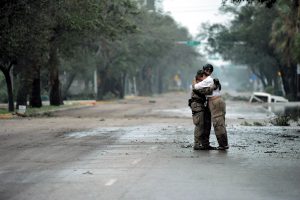
The past few months have been like an endless series of natural disasters. First, there were the devastating floods in South Asia during the summer. Then, starting at the end of August, the U.S. got hit by hurricanes: Hurricane Harvey in Houston and Hurricane Irma in Florida. Simultaneously, Hurricane Katia battered Mexico, which in early September also experienced an 8.2 magnitude earthquake. On September 19, Mexico experienced another earthquake, of 7.1 magnitude, in the capital. And, we are currently witnessing Hurricane Maria, which is threatening North Carolina and has already damaged the Dominican Republic and Puerto Rico. Whether this row of natural disasters is a product of climate change or just a random coincidence is debatable, yet what is clear is that in the aftermath of all these events, people are in need of help and governments have to step up to provide it. At the same time, as discussed in my previous blog posts, global businesses can serve as another source of global hope, be it in terms of combating major ongoing and acute issues such as climate change and the migrant crisis, or when people face unexpected disasters. Similarly to my point about the migrant crisis and global business involvement, corporate philanthropy might not be only a moral decision, either…
Recent research by Murad Mithani (2017), assistant professor at the Stevens Institute of Technology, indicates that corporate philanthropy in the aftermath of a national disaster can help multinationals to establish strong local ties, and overcome social and cultural barriers of foreign businesses in host locations.
First of all, Mithani acknowledges that the liability of foreignness (LOF), which may be reflected in a lack of trust and public recognition, discriminatory pricing by suppliers and rigid regulatory control by local authorities, remains a critical concern for many multinationals. He further postulates that this perception of foreignness and the according lack of social ties are not that easy to change, as trust and relationship quality have to be gained over time, rather than simply being expected. In other words, the local community needs a clear justification for embedding foreign business entities into their environment. And a natural disaster might in fact justify increased social integration.
In his research, Mithani argues that natural disasters and “collective stress situations”, which create social needs and new social spaces, can connect multinationals with their local communities. As hypothesized, in response to the engagement from a multinational, the community may reduce social and cultural barriers, and hence reduce the multinational’s LOF. Using the context of a national disaster in India, Mithani found support for this assumption, concluding that corporate philanthropy in the aftermath of a natural disaster can be mutually beneficial for foreign businesses and communities.
More specifically, the research indicated that after natural disasters multinationals may engage in larger philanthropic contributions than local businesses because, due to the global nature of their business, multinationals are not as affected by local disaster as local companies. Hence, multinationals can access a wider range of resources than local businesses. At the same time, given the long-standing social ties between local companies and their community, multinationals may encounter more resistance and, hence, work harder on proving their reliability and authenticity. The research data indicate that local stakeholders may penalize multinationals for a perceived self-promotional bias, and thus in their efforts to win local trust, multinationals should refrain from advertising activities and pairing philanthropic efforts with promotional goals.
Finally, the study indicates that multinationals’ efforts should become long-term oriented, as this confers greater rewards from the local community. Indeed, long-term philanthropic engagement can not only create social ties and trust, but also results in greater performance, compared to local companies. As local companies may be struggling with economic constraints following the disaster, multinationals’ global scope decreases such pressures, allowing the latter to invest further and benefit from the naturally occurring contrast.
As such, the findings suggest that there is more to multinationals’ philanthropy than moral satisfaction. It can play a strategic role in decreasing host-environment barriers, hence improving the embeddedness in the local community and subsequent business performance. In other words, in the wake of a crisis, there are plenty of sources for mutual benefits. We can only hope that businesses can find more alternatives for such mutual dependence and community engagement, that don’t involve such extreme circumstances as natural disasters.
Further reading:
Mithani, Murad, Liability of Foreignness, Natural Disasters, and Corporate Philanthropy (2017). Journal of International Business Studies (2017), doi:10.1057/s41267-017-0104-x. Available at SSRN: https://ssrn.com/abstract=3036099


It is always important to help people who have been hurt by tragedy however most proper response should be provided to suit the immediate needs of the victims. Corporations must study the area immediate needs before taking action such that the victims are provided what exactly suits the situation.
Natural disasters are the worst incidents in every person’s life. I hope no one experiences a natural disaster.
Precisamos de parar com os desmatamentos, cuidar de nossos rios, de nossas florestas. Não existe vida sem natureza.
Yeah! its true and very Pathetic. The victim of Natural Disaster only can feel it.
This study examines how philanthropy can mitigate liability of foreignness (LOF) in the aftermath of a national disaster. A major disaster restructures the social landscape, creating an avenue for corporate contributions to play a role in recovery and relief efforts
we are greatly damaged what you write hopefully all will be good, we are here always pray for you